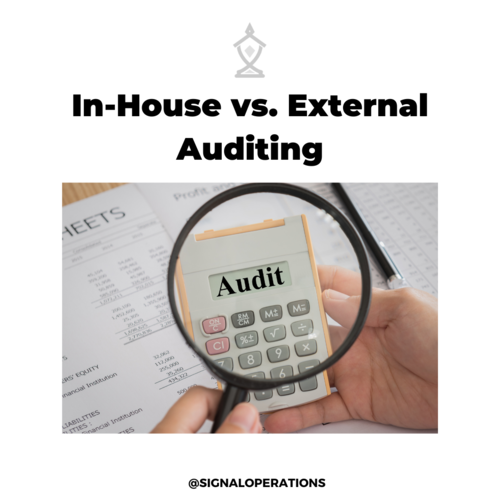In-House Vs. External Auditing
Auditing refers to the examination of a business’s or person’s accounts, financial statements, etc. to determine that everything is in order.
We are going to talk about two kinds of auditing today, in-house/internal and external. So, what is the difference? Well, to understand that, first, you must understand what they are to begin with.
What is In-house Auditing?
In-house auditing refers to auditing done by a person or department within your business to examine your finances. Using this information, you can improve your business’s organization and manage risk factors.
“Internal auditing is an independent, objective assurance and consulting activity designed to add value and improve an organisation’s operations. It helps an organisation accomplish its objectives by bringing a systematic, disciplined approach to evaluate and improve the effectiveness of risk management, control, and governance processes.” - ECIIA
In-house auditors report to their company’s management.
What is External Auditing?
Just like in-house auditing, external auditors examine a company’s finances, but instead of being done by someone within the company, this is done by an independent accountant. This kind of auditing is often used to certify a company’s financial statements to appeal to investors and shareholders rather than provide advice and knowledge to grow and improve your company on.
“The company can receive more efficiency by using an external auditor. This could happen for many reasons: company employees are already occupied on other tasks, external auditors are better trained for the purpose, internal fraud may prevent an internal audit from being valuable, and more.” - Strategic CFO
External auditors often report to the company’s shareholders.
External audits are also done involuntarily when the government questions the financial statements of a company. If your accounting is thorough, truthful, and well organized, these audits should go fine.
Advantages of In-house Auditing
The advantages of in-house auditing include:
It’s generally a lot cheaper as external auditors tend to be twice as expensive hourly as an in-house auditor.
In-house auditors are a part of your company so they have the internal knowledge and understand the functions of your company. This gives them a lot more knowledge, to begin with in their reports.
In-house auditors can provide you with a lot of advice through their findings.
Advantages of External Auditing
The advantages of external auditing include:
External auditors tend to be more efficient, so even if they cost more hourly, they may take fewer hours to get their work done.
External auditors have an outside view without risk of any bias.
External auditors can provide you with a more diverse set of skills, especially if your company is smaller.
In short, in-house auditing provides information a company can use to improve, while external auditing provides certification of a company’s finances that people such as shareholders, investors, and the government needs.
What you chose is up to you and your company’s needs. Often, larger companies do both, but that isn’t always an option for everyone. Assess your company’s needs and choose which fits that most.
Which do you prefer? In-house or external auditing? Let us know in the comments below!
If you need some more help figuring this all out or need any other bookkeeping/accounting help, book a discovery call.


